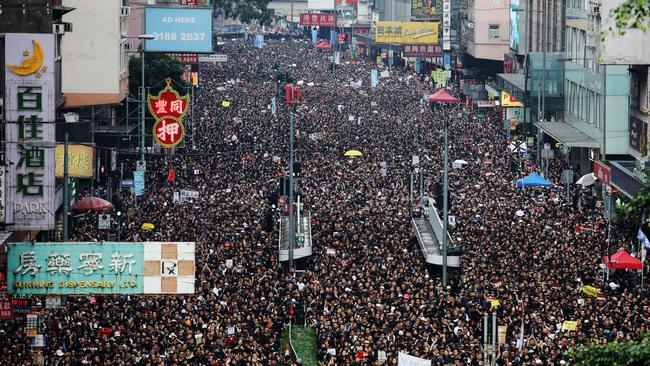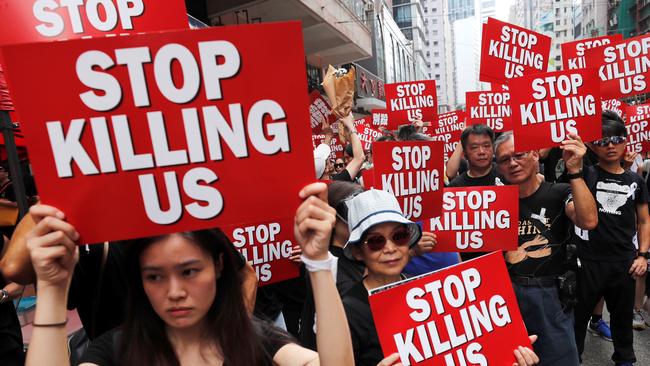Million voices united in fear of Beijing
More than a million people march, determined to stop their rights being taken by Beijing.

They flowed through the centre of Hong Kong like a great, black river; more than a million everyday people united by fear of Beijing, mistrust of their own government and a determination to stop their democratic rights from being taken.
For the second consecutive Sunday, they filled the city streets with a cacophonous, orderly procession. This time, they came to show that, despite an attempt by Hong Kong Chief Executive Carrie Lam to defuse the growing crisis, they won’t be easily assuaged.
If the government does not withdraw altogether its legislation to allow Hong Kong citizens to be extradited to mainland China, if it does not admit it was wrong and abandon its plans, they will keep on marching.
Lam moved her position only slightly last night when she apologised for “shortcomings in the government’s work” that had “disappointed and distressed many citizens”. But it won’t be enough for the protesters.

“Hong Kong isn’t naive,’’ said Percy Poon, a 37-year-old social worker marching hand-in-hand with his six-year-old daughter. “We have brains, we have our thoughts, we have our rights. I just want to protect our future, our next generation.’’
His wife, Rosana Ho, said Hong Kong had become a dangerous place. “We do not trust the government, we do not trust China,’’ she said.
They gathered hours before the march was scheduled to start, in Victoria Park at the eastern end of the city.
There were school groups and uni students, union and political activists, celebrities and ordinary families who gave up their Sunday to protest what they see as an attack on the democratic traditions of Hong Kong.
Jacqueline Chan is just 17 and still in high school. She described the extradition treaty as an assault on the freedom of expression that Hong Kongers have enjoyed since British rule.
“If this law is passed, we will have concerns before we speak,’’ she said. “It is not the freedom we are supposed to have. It is very sad if the law is passed.’’
Student Mandy Wong, 18, came to march with about 40 of her classmates. “The extradition law is destroying the ‘one country, two systems’. Although I am only a student, Hong Kong is my home and I need to protest it and tell Carrie Lam that the extradition law cannot be introduced.’’
One of Wong’s classmates, 18-year-old Annabelle Cheung, said she hadn’t planned to march. Then she saw a news report about a man who plunged to his death on Saturday night after scaling a city building site to protest against the extradition laws. “I realised that if someone has sacrificed I cannot just sit at home. I must do something,’’ she said.
The protesters were clad predominantly in black. Many carried white lilies and wore white ribbons in tribute to the fallen man, the first known casualty of the anti-extradition campaign.
By late afternoon, the base of the building site on busy Queens Road had become an impromptu shrine. The proposed extradition laws are for now dormant. Lam, the Hong Kong Chief Executive since 2017, announced on Saturday that the legislation would be suspended and not debated further before the summer recess to enable her government to consult more widely on the proposed changes.
Lam said the decision was taken to restore civil order after protesters clashed violently with riot police last Wednesday, leaving more than 80 people injured.
She remains convinced the proposed laws are necessary to prevent Hong Kong from becoming a refuge for criminals wanted on the mainland. The legislation was initially rushed into parliament to allow Taiwan to extradite a Hong Kong man accused of murdering his pregnant girlfriend.
Lam said the proposed laws would also help combat money laundering and terrorism.
“The original purpose of the bill is still correct in my mind,’’ she said on Saturday. “We need to be open, we need to communicate and listen. In other words, we are going to listen to different views — as long as we have the same purpose.’’
Lam is well known to Australia, particularly within the business community. Speaking at last month’s Australia-China Business Awards, she vowed to “safeguard fiercely’’ the judicial independence of Hong Kong, currently served by four Australian justices.
As she explained on Saturday, she is also required by Hong Kong’s mini-constitution, the Basic Law, to serve two masters; the central people’s government and the people of Hong Kong. She said Beijing backed her decision to shelve the legislation.
The tactical retreat appears to have removed heat from the crisis but none of the underlying anger.
Australian Foreign Minister Marise Payne welcomed the decision to suspend the proposed laws. “Australia values Hong Kong’s unique advantages and freedoms under ‘one country, two systems’, the rule of law and its independent judiciary,’’ she said.
Bonnie Leung, a co-convener of the group which organised yesterday’s march, the Civil Human Rights Front, said a temporary halt to the legislation was not enough. She urged opponents of the legislation to continue their campaign throughout the summer.
Denise Ho, a veteran of the “Umbrella Movement” which campaigned five years ago for Hong Kong to be given free elections, said Hong Kongers had been lied to too many times to trust their own government and Beijing.
Ho, a celebrated singer and prominent gay rights campaigner, was arrested for her part in the 2014 protests and is now banned from performing in mainland China. She said the extraordinary turnouts for yesterday and last Sunday’s march showed that people were no longer willing to have their democratic freedoms impinged. “It’s an accumulation of all the frustration and all this disappointment with a government that doesn’t listen,’’ Ho said.
“We have been tricked and lied to many, many times and Hong Kong is smart enough. Among the people, all the emotions in this fight have not died down.’’
By nightfall, the march was still in full voice and major thoroughfares impassable. Although calm will return, there are deep concerns about what will come next.
After protesters clashed with police last Wednesday, student activists were arrested at university and the administrator of a messaging app group used to organise the protests was threatened with serious criminal charges.
Lee Cheuk-yan, a former legislator with the Hong Kong Labour Party, said the extradition bill was not the only thing that Hong Kongers had to fear, particularly once the international media moved on from the story.
“What we worry about the next few months is not just the extradition bill,’’ he said. “What we worry about the next few months is the government will start a white terror against people who participated in the protest. We don’t want Hong Kong to be ruled by fear.’’



To join the conversation, please log in. Don't have an account? Register
Join the conversation, you are commenting as Logout